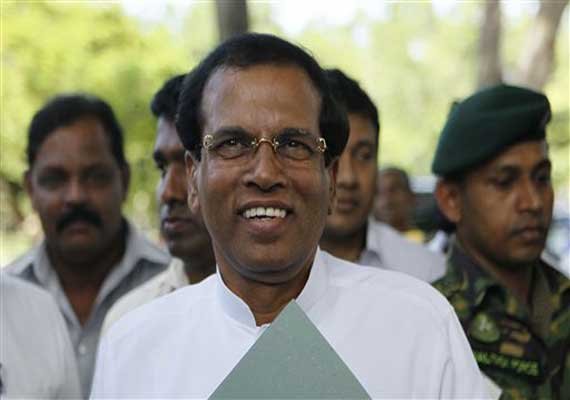
Colombo: Sri Lanka's health minister quit President Mahinda Rajapaksa's government Friday to challenge him in the upcoming elections, accusing the leader of taking the country toward an autocracy.
The defection of Maithripala Sirisena, who is also No. 2 in the Sri Lanka Freedom Party, the largest in the ruling coalition, is a serious setback for Rajapaksa's quest for a third term. He is still popular after leading a military campaign to end a 25-year civil war against Tamil Tiger rebels, but the erosion of support from within his own party is unprecedented.
Sirisena left the government with three other ministers and a lawmaker, saying on Friday he has been chosen as the combined opposition's presidential candidate.
“After the war victory, the present government started veering in a direction that none of us expected,” Sirisena told reporters, flanked by his colleagues and former President Chandrika Kumaratunga.
“Looking at the path that the country's leadership and the administration travel, the country is heading toward a beatific autocracy. Elections are held; concessions are given; development takes place, (but) behind a smiling face are many things that the people and we can't approve of,” he said. “One family has captured the country's economy, wealth, administration and the management of the political party.”
Rajapaksa announced on Thursday he's seeking a third term, two years before his second term ends. The Elections Department set Jan. 8 as polling day.
Since taking power in 2005, Rajapaksa has given his family and friends more say in governance and significant control over the national budget. One Rajapaksa brother is the powerful minister of economic development, another is Parliament speaker and another is defense secretary.
The president's elder son is a lawmaker, a nephew heads a provincial government and other relatives and friends are in the bureaucracy and the diplomatic service.
Speaking at a function later Friday, Rajapaksa claimed opposition parties had caused the defection because they could not find a strong candidate to challenge him.
“There is no competition for me. ... We have done good work, we have freed the country we have ended the war and we will not let anyone stall our march forward,” said Rajapaksa.
Sirisena promised to abolish the powerful presidency and return to a government headed by a prime minister that was prevalent before 1978. He promised also to set up independent bodies to appoint judges, police chiefs and others.
Sri Lanka's constitution had a two-term limit for the presidency, but Rajapaksa used his overwhelming support in Parliament to scrap the limit and to ensure the country's highest court was full of his appointees. The court said earlier this month his pursuit of a third term was legal.
Sirisena said the constitutional change that lifted term limits was “a serious mistake.”




















